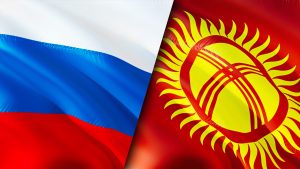During a bilateral meeting between Russian Prime Minister Mikhail Mishustin and his Kyrgyz counterpart, Chairman of Kyrgyzstan’s Cabinet of Ministers Adylbek Kasymaliev, the Russian official reportedly registered complaints regarding “a number of issues that cause us serious concern.”
On the sidelines of a January 31 Eurasian Economic Union (EAEU) gathering in Almaty – the meeting of the Eurasian Intergovernmental Council, comprised of EAEU member-state prime ministers – the Russian an Kyrgyz prime ministers met.
According to a readout posted to Telegram of the meeting by the Russian side, Mishustin “expressed hope that Kyrgyzstan, under the leadership of Adylbek Kasymaliev, will continue to strengthen cooperation with Russia in all areas.” The post went on to note several areas where joint projects have been proposed, including in manufacturing, energy, transport, “geological exploration,” and the digital economy.
Long intertwined, Kyrgyzstan’s economic relations with Russia have only deepened since Moscow’s full-scale invasion of Ukraine in February 2022. For example, Kyrgyz exports to Russia exploded, from a baseline of $377 million in 2019 (before the COVID-19 pandemic) and $425 million in 2021 to $1.07 billion in 2022. That figure contracted in 2023 to $743 million, but the spike is clear. On the other end, Kyrgyz imports from Russia have risen since before the pandemic but remained relatively steady: $1.4 billion in 2019, $1.91 billion in 2021, $2.4 billion in 2022, and $2.18 billion in 2023.
Perhaps more relevant: Russian foreign direct investment in Kyrgyzstan has risen in recent years. In the first half of 2024, the volume of Russian FDI in Kyrgyzstan increased by 24.2 percent.
During their bilateral meeting on January 31, according to the Russian account, Mishustin asked “that the leadership of Kyrgyzstan stop administrative pressure on our companies and ensure the protection of the rights and legitimate interests of Russian investors.”
On Telegram, the Russian government shared a quote from Mishustin which minced few words:
There are a number of issues that cause us serious concern. These are unfounded claims and illegal statements by high-level representatives of Kyrgyz government bodies against honest, bona fide Russian companies that are developing the economy of Kyrgyzstan, creating new jobs, and are among the largest taxpayers. Specific facts of illegal, sometimes extortionate actions are set out in a diplomatic note from the Russian Ministry of Foreign Affairs. We ask that the leadership of Kyrgyzstan stop administrative pressure on our companies and ensure the protection of the rights and legitimate interests of Russian investors.
On February 3, Mishustin spoke again with his counterpart, Kasymaliyev, by phone.
According to RFE/RL’s Kyrgyz Service, Azattyk, the Kyrgyz Cabinet of Ministers press service statement only “noted the high level of bilateral relations and emphasized the importance of further expanding cooperation in priority areas,” without mention of Mishustin’s complaints.
While Mishustin gave no specifics, Azattyk noted that in November 2024, Kyrgyzstan’s State Committee for National Security (SCNS) searched the Yandex.Taxi office as part of a tax evasion investigation. Yandex.Taxi is a ridesharing company under the broader umbrella of Yandex, a massive Russian technology company akin to Google.
On February 3, the chair of the Kyrgyz State Tax Service, Almambet Shykmamatov, released a statement referring to Mishustin’s complaints as “an inaccuracy.” He called Mishustin’s used of the word “extortion” a “gross exaggeration.”
“We do not divide taxpayers into those from our country, from a large power or from a small state. The tax norms established by law apply equally to everyone, and everyone complies with them,” he said.
Shykmamatov stressed his belief that the issue at hand “is a normal economic issue, and it should not affect the strategic relations between the two countries.”
Incidentally, Kasymaliev was named chairman of the Cabinet of Ministers in December following the resignation of his predecessor, Akylbek Japarov (no relation to Kyrgyz President Sadyr Japarov), amid a scandal involving the State Tax Service. Shykmamatov also took on his post leading the tax service in December, following the arrest of his predecessor, Altynbek Abduvapov.
Akylbek Japarov’s resignation has not officially been tied to the scandal. Regardless, his resignation after three years running the Kyrgyz government under President Japarov is worthy of attention. During that period, he saw through considerable reforms. When asked about the situation in December, SCNS head Kamchybek Tashiev answered: “[Akylbek Japarov] left because there was a connection with something. He didn’t just leave.”
The Russian prime minister, as noted above, did not name names, but given the intertwined nature of the Kyrgyz and Russian economies – and the possibility of greater U.S. sanctions – this spat is worth watching.

































